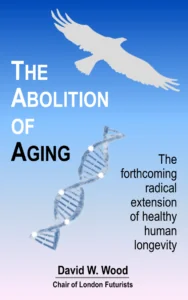The Abolition of Aging – A Book Review

As you might recall, in my review of Ending Aging, I said that the book could have benefited from a more in-depth discussion of the benefits of rejuvenation as well as the concerns and objections often raised against it. Anyone else sharing the same feeling will find what they’re looking for in The Abolition of Aging, by Chair of London Futurists David Wood.
 Written in an elegant, clear style, The Abolition of Aging brilliantly accomplishes the difficult task of guiding the reader through all the turns and twists of the topic, explaining in great detail the benefits that would derive from a successful implementation of the “rejuveneering project”—as Wood calls it—presenting all the typical objections and related counterarguments, and—in the words of 3G Doctor Director David Doherty—providing innumerable “stunning references and observations”.
Written in an elegant, clear style, The Abolition of Aging brilliantly accomplishes the difficult task of guiding the reader through all the turns and twists of the topic, explaining in great detail the benefits that would derive from a successful implementation of the “rejuveneering project”—as Wood calls it—presenting all the typical objections and related counterarguments, and—in the words of 3G Doctor Director David Doherty—providing innumerable “stunning references and observations”.
Just like there’s no time to waste if we want to defeat aging in time for currently living people to benefit, Wood wastes no time with lengthy preambles; the very first line of the foreword comes directly to the point, bluntly stating what readers unfamiliar with the topic may find shocking: the possibility of eliminating biological aging is now within striking distance.
Possibly preventing the reader’s reaction, the author immediately gives a preliminary discussion of the traditional responses to his claim: “it’s not possible” and “it’s not desirable”, which Wood ascribes—correctly, in my opinion—in no small part to a great desire to avoid an unpleasant discussion that would force us to reconsider many assumptions on the inevitable finitude of human existence, with which most of us have already made our peace.
To succeed in his task of getting us to snap out of a multi-millenary Stockholm syndrome that pushes humanity to praise the tyranny of old age, Wood resorts to every weapon in his arsenal, making a very convincing case that rejuvenation is very much desirable as well as possible.
Skeptics who assume that the technology necessary to rejuvenate people is centuries away will be surprised to learn about how advanced the field actually is and how much faster it is likely to grow than conventional wisdom would have it. The word of senior scientists who claim that the reversal of aging is nothing but a pipe dream, as Wood warns us, should be taken with a grain of salt: The Abolition of Aging provides plenty of examples of luminaries and eminent experts of the past summarily dismissing scientific theories and technologies that today are well-established and taken for granted by everyone. (Among many such examples, one I really cannot abstain from mentioning is the hilariously wrong 1903 prediction by the New York Times that human flight, if at all possible, would take one to ten million years to come true. Less than 70 years later, not only was human flight commonplace, but human beings had landed on the Moon.)
Nonetheless, Wood’s optimism should not be mistaken for complacency. He makes no mystery that the success of the rejuveneering project is a mere possibility, however likely, and not at all a certainty. Many are the unknowns—scientific, political, societal, financial, and more—that could well thwart our efforts in this direction if we’re not careful. Wood offers advice on how to deal with these issues standing in the way of an aging-free world as well as those that might lurk beyond. After all, the functioning of society as we know it hinges on the existence of aging; our lives, our policies, and our customs are built around it.
Eliminating aging would require a serious rethinking of much of society’s inner workings, and this operation is not free of risks, as Wood rightfully concedes. Great changes for the better often come with potential downsides, but we should not let this deter us; rather, we should appreciate how the fruits to be reaped are well worth the potential risks involved and act now to prevent or mitigate any unwanted consequences. A world without aging would need to be managed in a different way, but that is not a problem.
A particular obstacle on the way to a world without aging is represented by adverse psychology, to which Wood dedicates an entire chapter. Ever since we had the ability to reflect upon ourselves and the human condition, as the author explains, we’ve had to face our own mortality and fear of death. Fear of death is a very useful adaptation to increase the chance that an individual will live long enough to reproduce, but in the case of a highly self-aware species like us, it’s a double-edged sword. Our deep desire to express ourselves, to learn, create, grow, to live, inevitably clashes against the knowledge of our apparently inescapable demise.
If left unresolved, this inner conflict could strike terror so paralyzing that living our lives would be impossible. With no hope of defeating an apparently all-powerful enemy such as death, the young human race had to devise other ways out of this conundrum—psychological expedients to sugar the pill or even make it appear better than the alternative; for some, having children, creating art, changing the world through their work and so on may all offer the comforting thought of their legacy, and thus part of themselves, carrying on at least to some extent; believers have faith that their immortal souls will continue existing even after their bodies will have perished; others assume a world without death would, for one reason or another, be so unbearable that oblivion would be preferable.
These mental devices have existed for so long that they’ve shaped our society and our morals; accepting death has become a sign of wisdom while trying to avoid or delay it when “the right time” has come is seen as a sign of immaturity and selfishness. These views are so entrenched in most people that any attempt to question their validity is likely to trigger aggressive defensive reactions or, sometimes, contempt and ridicule. For these reasons, life extension is not an easy idea to sell. In his detailed discussion, though, Wood provides valuable advice to ease the advocates’ task, listing the dos and don’ts of how to present the subject.
Rejuvenation is not all the book deals with. Wood’s futurist soul fully reveals itself in his vision of the futures of humanity, faith, and death, which are discussed in the chapter “Towards Humanity+” as well as in the possibilities outlined in chapter 12, “Radical alternatives”, such as cryonics, head transplants, and mind uploading. While these ideas are often plagued by abundant hype and unjustified premature enthusiasm, I find that Wood simply presented relevant facts as they are, with an appropriate dose of healthy skepticism where needed but without any undue disbelief. Cryonics in particular, which is usually unjustly regarded as a scam to part rich fools from their money, is presented as a valid backup plan for those who don’t expect to live long enough to see the dawn of rejuvenation; just like cryonics companies themselves, Wood makes no mystery that it is uncertain if bringing back to life cryopreserved patients will ever be possible, despite encouraging successes with transplantation of cryopreserved animal organs. Then again, I would add that if the chances of coming back to life from cryopreservation are uncertain, there’s no chance whatsoever of coming back after being buried or cremated.
Summing up, I believe that The Abolition of Aging is a must-read for experienced advocates and newcomers alike. People who haven’t made up their minds about supporting rejuvenation will be fully equipped to make an informed decision after reading this book, or, at the very least, will be able to research the topic further; advocates will have plenty of references and useful information for their advocacy efforts. Together with Ending Aging, this book answers pretty much all the whats, whens, hows, and whys to the best of our current understanding.








